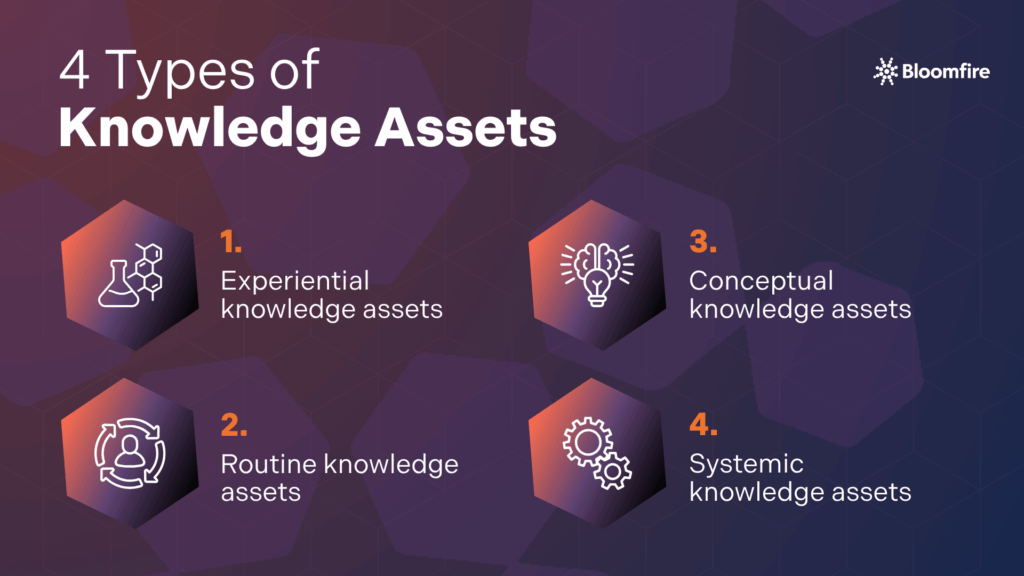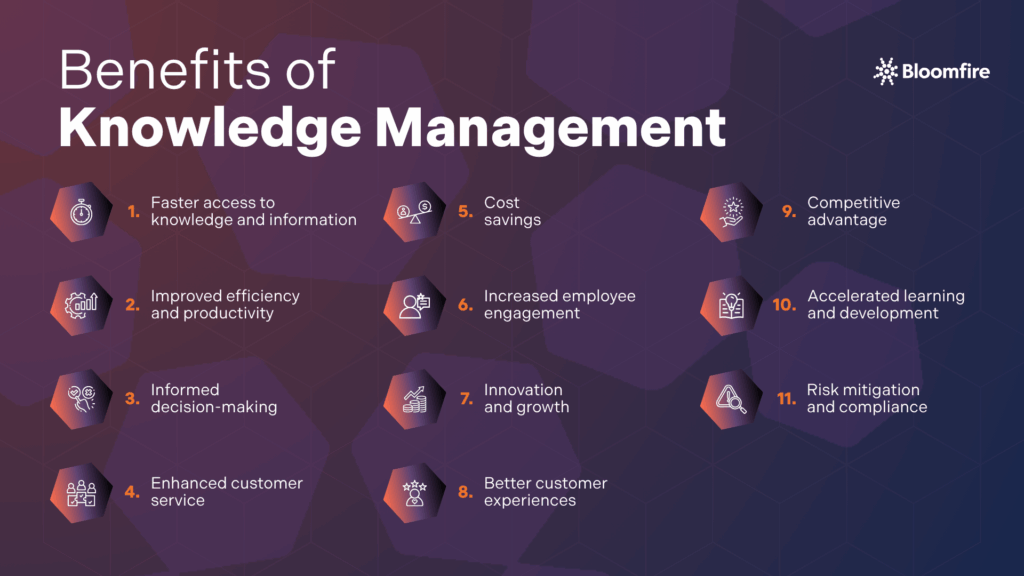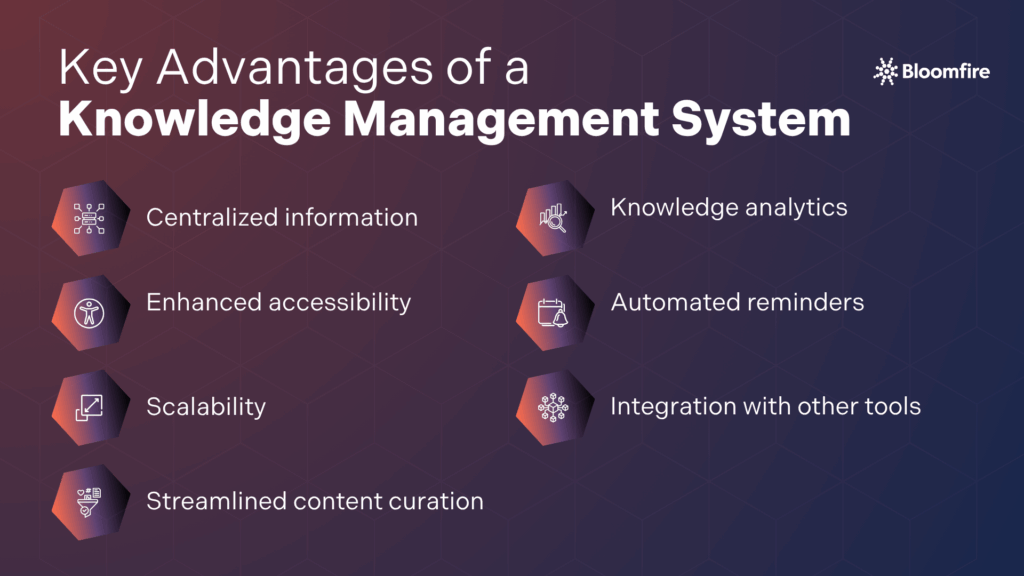11 Benefits of Knowledge Management (+ KMS Advantages You Shouldn’t Miss)

Knowledge management (KM) is more than just a concept; it’s a strategic approach that ensures your organization can leverage its collective expertise. You can develop a more effective strategy for securing leadership buy-in and implementing the program if you understand the benefits of knowledge management. In doing so, you’ll also have a better grasp on the true advantages of using a KM system to unlock the potential of your team’s insights and experiences, driving growth and innovation.
Without a robust knowledge management system, organizations risk losing valuable knowledge and missing critical opportunities to boost efficiency and enhance customer experiences, underscoring the importance of organizational knowledge. As you explore this article, you’ll discover how implementing robust knowledge management can transform your organization.
Defining Knowledge Management
Knowledge management is the process of systematically capturing, distributing, and effectively using knowledge within an organization, as described by KM expert Tom Davenport. This process not only preserves valuable insights but also enhances accessibility, ensuring that critical knowledge is available to those who need it when they need it.
The primary goal of knowledge management is to enhance performance by making the right information available to the right people at the right time. But what exactly constitutes this invaluable information, and how do we identify and leverage it within an organization? These crucial pieces of information are often referred to as knowledge assets.
What Are Knowledge Assets?
Knowledge assets, or intellectual capital, represent the accumulated organizational resources, including databases, content, guides, policies, and procedures. These assets are integral to knowledge management, leveraging organizational expertise to meet strategic KM goals.
Similarly, knowledge management is essential for effectively managing knowledge assets, as it ensures that valuable organizational insights, data, and expertise are made accessible in the most organized and efficient manner possible.
The benefits of these assets are vast and help process knowledge management solution requests in a more streamlined approach. This is because leaders may see the value of company knowledge and Enterprise Intelligence in a new light.

Knowledge assets come in four forms: experiential, routine, conceptual, and systemic, each playing a vital role in the organization’s knowledge framework. Here’s a detailed breakdown of these four categories:
1. Experiential knowledge assets
These are knowledge assets attained through the joint, direct involvement of the organization’s members. Known as tacit knowledge, this type of knowledge is gained through personal experience and context.
For instance, employees might gain tacit knowledge by shadowing a more experienced coworker or asking questions of a subject matter expert, illustrating the advantages of knowledge management.
2. Routine knowledge assets
Routine knowledge assets, another type of tacit knowledge, have become embedded in the company’s actions and processes. These include knowledge about company culture or the best ways to perform everyday tasks, showcasing the benefits of knowledge management systems to business.
3. Conceptual knowledge assets
These are more definitive assets based on the judgments of customers and employees. Examples include brand designs, customer data such as customer profiles, market research, and customer insights reports, which demonstrate the advantages of the knowledge management system in enabling informed decisions.
4. Systemic knowledge assets
Like conceptual knowledge assets, systemic assets are definitive and explicit. They include company policies, procedures, and process documentation—standard documentation that employees must be familiar with to perform their jobs well. This emphasizes the benefits of knowledge management systems.
Recent trends in knowledge management emphasize the growing role of AI and machine learning in enhancing knowledge assets. Gartner research predicts that by 2026, enterprises leveraging AI systems will see at least a 25% performance advantage.
Proper classification of knowledge assets underpins improved decision-making, streamlines operations by reducing redundant efforts, and provides a clear overview of an organization’s existing knowledge and potential gaps. All these outcomes contribute to enhanced competitive advantage and innovation.
What Are The Benefits of Knowledge Management
The benefits of knowledge management in an organization extend across various facets of organizational functioning. Fostering a culture of learning and knowledge sharing enables your team to work more efficiently and effectively, ultimately leading to improved performance and outcomes. This strategic approach transforms individual insights into Enterprise Intelligence.

1. Faster access to knowledge and information
Speedy access to vital information can significantly ease onboarding new roles like a Director of Customer Service. A centralized knowledge management system ensures that new hires and experienced employees know exactly where to find the needed information, demonstrating one of the key benefits of knowledge management.
According to Bloomfire’s Value of Enterprise Intelligence Report, a strong knowledge management program can save employees 3.9 hours per week, boosting workforce capacity by nearly 10%. This is like gaining 98 full-time employees for every 1,000 staff members.
2. Improved efficiency and productivity
Efficiency in the workplace means streamlined processes where employees don’t waste time or energy. Knowledge management systems reduce the time spent searching for information, allowing employees to focus on more impactful activities, which is a prime example of the advantages of knowledge management systems.
Organizations with strong knowledge management practices see a 15-30% boost in productivity, leading to significant cost savings, according to an Aberdeen Group study. This translates directly to a healthier bottom line and more efficient operations.
3. Informed decision-making
Knowledge management equips decision-makers with a comprehensive view of the data and insights available throughout the organization, facilitating more informed decision-making.
For instance, by providing quick access to past project outcomes, market research, and competitor analysis, knowledge management enables leaders to make more informed and strategic choices, rather than relying on partial information or intuition.
This advantage highlights the importance of knowledge management within an organization, enabling informed and strategic decision-making. While many types of knowledge management systems cater to this goal, a KM hub that fuels the use of Enterprise Intelligence, like Bloomfire, can supercharge this benefit.
4. Enhanced customer service
Knowledge management enables customer-facing employees to access the company’s knowledge base swiftly and deliver the information customers need without delay. This capability is crucial in providing timely, consistent solutions to customers, highlighting the benefits of knowledge management systems to businesses.
A well-organized knowledge base, enhanced by AI-powered insights, can boost first contact resolution (FCR) rates by up to 25%. Such immediate access enhances customer satisfaction and strengthens brand loyalty. It also empowers employees to resolve inquiries efficiently, improving operational effectiveness.
5. Cost savings
One of the fundamental advantages of knowledge management systems is cost-effectiveness. Savings arise from reducing employees’ time searching for information, needing fewer systems to store knowledge, and minimizing errors and duplicated efforts.
For example, a company implementing a KMS might see a significant drop in support tickets because customers can find answers themselves. Similarly, new hires can get up to speed much faster without extensive one-on-one training, saving valuable person-hours.
6. Increased employee engagement
Creating a knowledge base allows employees to contribute their expertise and insights, fostering a sense of ownership and satisfaction. This engagement benefits the business and its employees, benefiting knowledge management systems.
Companies utilizing robust knowledge management practices have reported a 15% rise in job satisfaction. This often stems from a collaborative environment where shared understanding flourishes, leading to more informed decision-making and continuous improvement.
7. Innovation and growth
A culture of knowledge sharing empowers employees to add to the organization’s knowledge base, enhancing collective intelligence. This environment fosters innovation and unlocks new growth opportunities, highlighting the key benefits of knowledge management.
For instance, when a sales team shares successful strategies and client feedback, other teams can learn from these experiences and adapt their approaches, leading to better outcomes. This kind of open exchange ensures that valuable insights are not lost but rather circulated and built upon throughout the company.
8. Better customer experiences
Providing employees with resources to share accurate, detailed, and current knowledge equips them to offer exceptional customer experiences. They get to address inquiries and provide consistent, reliable solutions — a foundation that fosters greater customer satisfaction and strengthens brand loyalty.
Negative experiences, such as prolonged hold times or inconsistent information, can erode customer trust. Conversely, quick and accurate responses reinforce customer loyalty and trust, showcasing the benefits of knowledge management systems.
9. Competitive advantage
An organization’s ability to effectively manage and leverage its knowledge is a valuable asset. Effective KM can provide a significant competitive advantage, enabling faster innovation, better decision-making, and improved operational efficiency. Harnessing knowledge can be the key to sustained success and market leadership.
For instance, a tech company that efficiently shares insights from customer feedback across its product development and marketing teams can quickly adapt its offerings to market demands, outpacing rivals. This strategic use of information drives continuous improvement and strengthens its market position.
10. Accelerated learning and development
Knowledge management accelerates learning and development within an organization by providing immediate and organized access to a wealth of information. Instead of employees reinventing the wheel or spending excessive time searching for answers, KM systems centralize best practices, lessons learned, training materials, and expert insights.
The available knowledge enables new hires to onboard more quickly, existing employees to acquire new skills or understand new processes rapidly, and teams to build upon past successes and failures, fostering a continuous learning environment that drives proficiency and innovation.
11. Risk mitigation and compliance
Robust internal knowledge contributes to risk mitigation. Centralized repositories of policies, procedures, and best practices ensure that all employees have access to the most current and accurate information. It reduces the likelihood of errors, inconsistencies, or deviations from established protocols that could lead to financial penalties, reputational damage, or operational failures.
Furthermore, a well-structured knowledge base allows for the systematic capture and analysis of past incidents, near misses, and lessons learned. Using these historical data, organizations can identify potential vulnerabilities proactively and implement preventative measures before risks materialize.
Case Studies on Key Benefits of Knowledge Management
Bloomfire’s case studies highlight several key benefits of implementing a robust knowledge management system, with a primary focus on improved efficiency and enhanced information accessibility. Organizations utilizing Bloomfire have reported significant reductions in the time employees spend searching for information, directly translating to increased productivity.
For instance, consumer packaged goods leader Conagra has significantly reduced the time its employees spend searching for information by implementing a centralized knowledge management system. This change underscores the importance of knowledge management in an organization.
Similarly, mortgage lender PennyMac has leveraged a knowledge management platform to ensure its customer service agents can quickly access the necessary information. This capability has substantially improved customer support, showcasing the advantages of knowledge management systems in delivering exceptional customer experiences.
These examples illustrate the key benefits of knowledge management systems to businesses by addressing challenges caused by information inaccessibility, thus optimizing operations and enhancing productivity throughout their organizations.
What Are the Key Advantages of a Knowledge Management System?
Organizations recognize the advantages of knowledge management systems as essential to their success. These systems are no longer just tools for efficiency; they are the central nervous system of an adaptive and intelligent enterprise.

Implementing an effective knowledge management system can lead to numerous positive outcomes, which include:
- Centralized information: A KMS provides a single repository for all organizational knowledge, ensuring consistent access and reducing duplicate efforts.
- Enhanced accessibility: Employees can quickly and easily find the information they need, regardless of their location or department, thanks to user-friendly search functionalities.
- Scalability: As the organization grows, a KMS can scale to accommodate increased data and user needs, ensuring continued effectiveness and efficiency.
- Streamlined content curation: Intuitive interfaces, often with rich text editors and multimedia support, make it simple for employees to contribute and update knowledge articles, FAQs, guides, and other content types.
- Knowledge analytics: A good KMS provides analytics and reporting on content usage, popular articles, search trends, and information gaps. This data helps identify what knowledge is being sought, what’s missing, and how to improve the knowledge base over time.
- Automated reminders: Some KMSs can automate content review cycles or send reminders to content owners to ensure updates, keeping the knowledge base current and relevant.
- Integration with other tools: A KMS integrates with business systems, such as CRM (customer relationship management) and help desk software, to empower customer service. Likewise, connecting with LMS (learning management system) and BI (business intelligence) tools helps facilitate continuous learning and provides insights into the business impact.
Harnessing the key knowledge management system advantages significantly depends on your choice of knowledge management solution. A system that aligns with your organization’s specific needs, integrates seamlessly with existing workflows, and offers intuitive features like robust search functionality and AI capabilities will maximize these benefits.
How to Get The Most Out of Your Knowledge Management Program
Implementing a knowledge management strategy is paramount to harness these KM benefits. This strategy involves a detailed plan that helps your company collect, store, and distribute information to leverage the benefits of knowledge management systems.
Implementing such a strategy can centralize and democratize your company’s knowledge, simplify information searches for employees, and enhance the absorption and application of organizational knowledge, underscoring the importance of knowledge management within an organization. Secure an effective KM strategy by doing the following:
- Develop a comprehensive plan: This plan should outline the procedures for collecting, storing, and disseminating knowledge within your organization on an ongoing basis.
- Encourage a culture of knowledge sharing: Foster an environment where employees are encouraged to share, update, and use knowledge regularly. This enhances the advantages of knowledge management systems by improving collaboration and innovation.
- Leverage technology effectively: Utilize the right tools and platforms, such as a knowledge management platform, that support the management and accessibility of knowledge. This is crucial for maximizing the advantages of the knowledge management system.
- Monitor and adapt: Regularly review and adjust your knowledge management practices to align with organizational changes and goals. Conduct a knowledge audit that involves taking inventory of your organization’s knowledge and evaluating how this knowledge is captured, organized, and preserved.
Integrating these practices means your organization can fully experience the advantages of a knowledge management system, thereby optimizing its intellectual capital. This holistic approach ensures that valuable insights and information are readily accessible and leveraged across all departments, thereby elevating the already promising benefits of knowledge management strategy implementation.
Frequently Asked Questions
How does a knowledge management system help organizations?
Knowledge management systems help organizations thrive by enabling effective knowledge sharing, supporting informed decision-making, and promoting innovation by connecting diverse expertise. These systems further enhance their value through seamless integration with other business tools, ensuring consistent application of knowledge across the organization.
What are the qualitative benefits of knowledge management?
The qualitative knowledge management system benefits to the organization include fostering a culture of continuous learning, collaboration, and innovation, alongside improving employee satisfaction and engagement. This enhances an organization’s adaptability, decision-making, and internal and external relationships.
How does a knowledge management system benefit employees?
A knowledge management system benefits employees by providing easy access to information, facilitating collaboration, and supporting informed decision-making, leading to increased productivity and job satisfaction. This central hub of organizational knowledge empowers them to learn continuously, innovate, and contribute more effectively to the company’s success.
What is the value of a knowledge base in knowledge management?
A knowledge base serves as the central repository for an organization’s collective intelligence, making information readily accessible and searchable. A well-maintained knowledge base enhances productivity, improves decision-making, and preserves valuable institutional knowledge.
Embracing Knowledge Management for Organizational Success
As you consider the benefits of knowledge management for your organization, it becomes clear that a robust KM strategy is essential for unlocking success. Keep in mind that implementing knowledge management is not just about implementing a system; it’s about fostering a culture of continuous learning and improvement. To learn more about how a tailored knowledge management system can benefit your organization, talk to our KM Expert today.
Protect Your Institutional Knowledge
Discover how a robust knowledge management system can safeguard your organization’s critical knowledge.
Explore KM Solutions

10 Best Knowledge Management Practices in 2026

Different Types of Knowledge: Implicit, Tacit, and Explicit

Striking the Right Balance Between AI and Human Customer Service

Estimate the Value of Your Knowledge Assets
Use this calculator to see how enterprise intelligence can impact your bottom line. Choose areas of focus, and see tailored calculations that will give you a tangible ROI.

Take a self guided Tour
See Bloomfire in action across several potential configurations. Imagine the potential of your team when they stop searching and start finding critical knowledge.